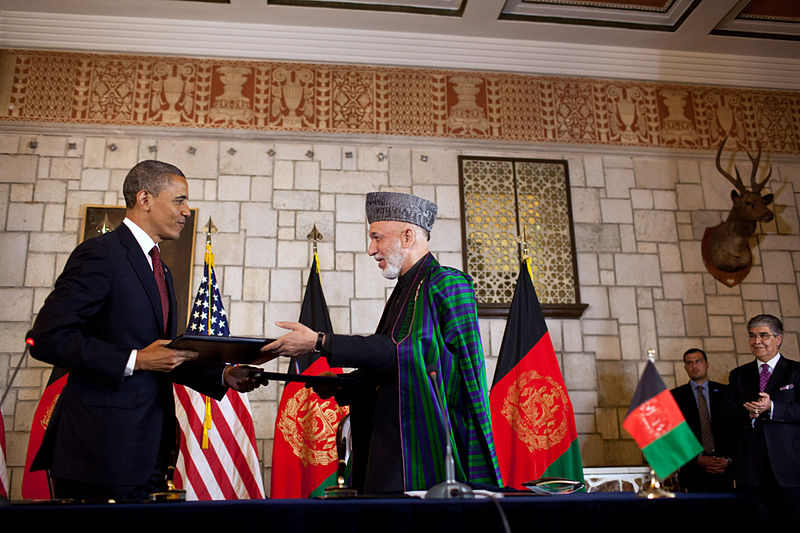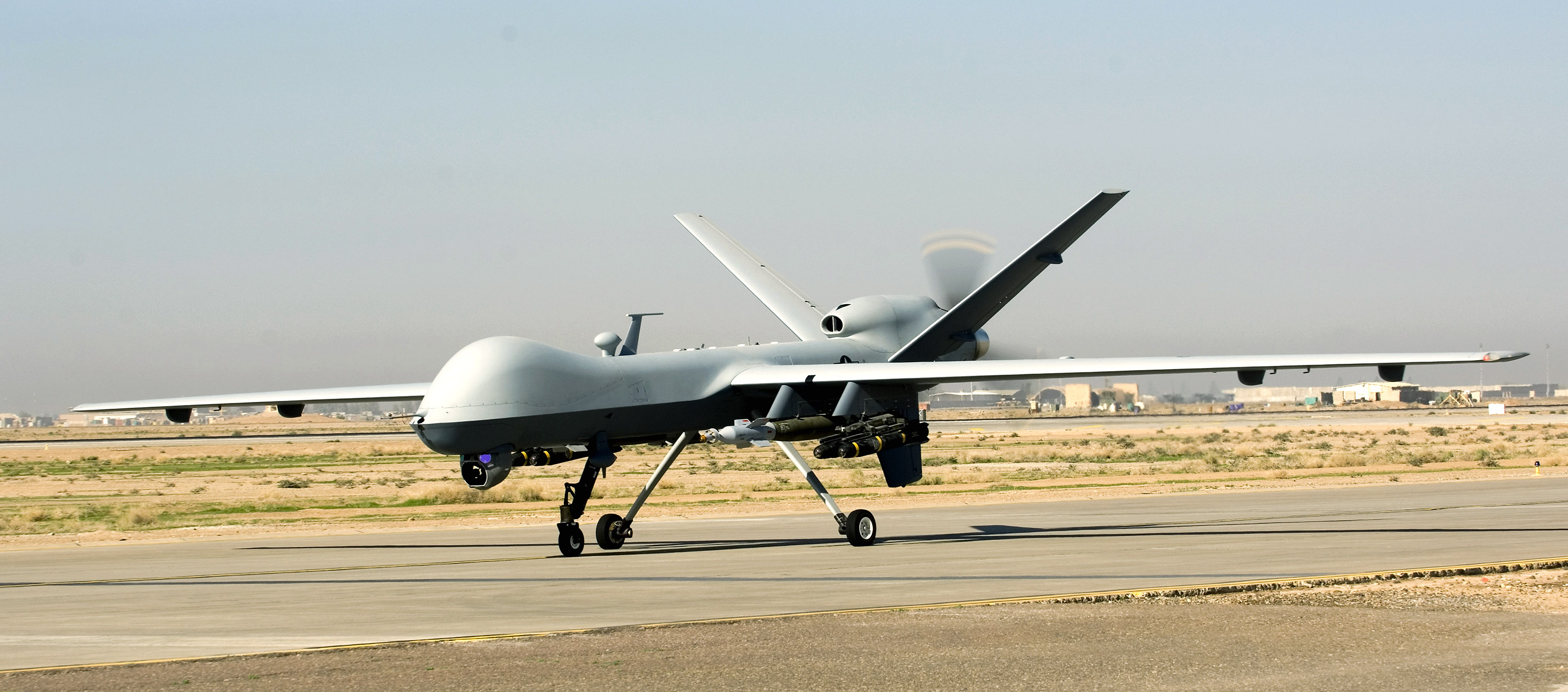
The United States and Afghanistan are at a pivotal point in their relationship in which current negotiations over the Bilateral Security Agreement (BSA) could have either beneficial or catastrophic effects for both nations. The outcome of these negotiations will dictate how much of a military presence, if any, the US will have in Afghanistan after 2014. US officials hope to keep troops in Afghanistan in order to prevent a resurgence of the Taliban and protect the enormous investment America has made in the region over the past 12 years of war. If no agreement is reached, the US will have no choice but to withdraw from Afghanistan at the end of 2014.[1] Currently, the main barrier inhibiting the finalization of the BSA is Afghan president Hamid Karzai, who has been resisting signing the agreement for months. Whether the BSA should be finalized or not is a complex issue, and multiple arguments exist both in support and in opposition of prolonged American presence in the region.
Afghanistan and the US officially launched their negotiations over the BSA in Kabul in November 2012 in accordance with the Afghanistan-US Strategic Partnership Agreement signed by President Karzai and President Obama in May 2012.[2] The purpose of these negotiations is to advance the cause of peace and security across Afghanistan, strengthen Afghan security forces, and pursue the countries’ shared goal of eliminating transnational terrorism. The BSA would allow US troops to remain in Afghanistan after NATO-led forces withdraw at the end of 2014.[3] A loya jirga, an assembly of approximately 2,500 Afghan elders and notables, was convened to discuss and vote on the agreement in November.[4] The loya jirga serves to make a group decision that will ultimately represent Afghan views. After four days of deliberation, the group of elders decided to back the BSA and encouraged Karzai to sign it before the end of 2013.[5] However, the jirga’s verdict is in no way binding and cannot force any action upon Karzai, leaving the decision of whether or not to finalize the security agreement up to him.[6]
Karzai ignored the jirga’s plea to sign the BSA by the end of 2013 and is demanding that additional amendments be made before he will approve it. This puts the US in a difficult position because officials want to complete the agreement quickly so that they can begin coordinating with NATO forces for post-2014 presence in Afghanistan if necessary. The US also wants to continue providing economic and military aid to Afghanistan in order to maintain the country’s stability, but can only do so once an agreement is reached. If Karzai does not sign the BSA in a timely fashion, the US risks looking weak and may be left with no option other than to withdraw entirely from Afghanistan.[7]
These negotiations are particularly important because Afghanistan is currently in a vulnerable transition phase, with two unanswered questions: How big of a role will American troops play in Afghanistan’s future? And is the Taliban likely to topple the existing Kabul government and seize power if international troops withdraw?[8] The policy established by the BSA will likely dictate the answers to both of these questions.
There is a conflict of interests in the negotiations surrounding this agreement, which has led to a stalemate. It is in the best interests of Afghanistan to maintain the upper hand by refusing to submit to deadlines imposed by the US, thus proving that it is a strong, independent nation that cannot be kept under the thumb of Western powers. When asked what he would consider a positive outcome of negotiations with the US, Karzai replied, “It is favorable if they surrender to us.”[9] As far as the interests of the US and NATO are concerned, officials have stated that they would like a decision to be reached as soon as possible so that they can begin to coordinate post-2014 forces.[10] A favorable outcome to the negotiations in the eyes of the US would include a guarantee that American soldiers will not face Afghan prosecution while carrying out their duties overseas. The US also hopes to retain the right to conduct counterterrorism raids on Afghan homes.[11]
The solution to this conflict may seem as simple as obtaining President Karzai’s signature, but so far that has proved to be difficult. One glaring issue is that Karzai has demanded the addition of new amendments to the BSA before he will give it his stamp of approval. Among these demands is a total ban on drone strikes and counterterrorism raids by US forces on Afghan homes, the authority of the Afghan judiciary to prosecute US forces, the US facilitation of peace talks with the Taliban, and the release of Afghan prisoners held at Guantanamo Bay.[12]
Another hurdle negotiators must overcome is the issue of NATO- and US-led drone strikes in Afghanistan. Karzai lashed out at US officials in November after discovering that NATO drone strikes had killed civilians in southern Afghanistan. Infuriated, Karzai responded with threats to cancel the security agreement altogether, stating, “For as long as such arbitrary acts and oppression of foreign forces continue, the security agreement with the United States will not be signed.”[13]
A third challenge facing negotiators is that President Karzai is the only official who can finalize the agreement. Karzai has explained that no minister would sign the BSA without his authorization, which he will only give if all of his requests are met. This certainly makes the process more difficult, as Karzai does not seem to ascribe the same urgency to the finalization of this agreement as does the US.[14] Karzai also refuses to believe that the US would ever withdraw all troops. When asked in an interview what would happen if US troops left, he smirked and replied, “The US has come and will not go, brother. It does not go. Therefore, ask for your demands and don’t worry.”[15] The Afghan president’s inflexible attitude is a cause for concern by officials on both sides of the negotiations and could ultimately be the downfall of the security agreement.
Taking all of the aforementioned viewpoints into consideration, it’s clear that there are several legitimate reasons for both nations to consider signing the BSA, in addition to valid reasons to refrain from signing it. Some would say that it is in the best interest of the Afghan people for President Karzai to sign the BSA promptly. Though the likelihood of the Taliban toppling the Kabul government in the absence of foreign forces is slim, the likelihood of civil war and increased internal violence is not. The withdrawal of foreign forces could create a power vacuum, which benefits no one but terrorists and extremists. It seems shortsighted of Karzai to continue refusing to compromise when an influential superpower ally is willing to support Afghanistan economically and militarily. Of course, Karzai has the right to make certain requests in his negotiations in order to achieve the best deal for Afghanistan, but his most recent demands are unreasonable. To think that he has the leverage to convince the US to release all Afghan detainees at Guantanamo Bay is unrealistic. Making this type of lofty demand is equivalent to setting the BSA up for failure, which is unfair to the Afghan people. The loya jirga, which aligns with the views of the Afghan people more closely than their president does, backs the BSA, and Karzai should honor its decision.
It may be in the best interest of the US for officials to avoid letting Karzai’s stubbornness discourage them. With his time as president coming to an end this April, Karzai is becoming increasingly detached from the Afghan population, and it’s possible that his recent behavior is part of a grasp at his last bit of leverage over the US before he leaves office.[16] Since Karzai’s opinion doesn’t necessarily represent the Afghan public’s political views, it would be imprudent of the US to allow his actions to determine the fate of America’s role in the country. This is especially true considering that Karzai is known for his hyperbole and emotion in his negotiations with the US. With groups such as Al Qaeda and the Taliban still at large, the stakes are high in Afghanistan, and the BSA is not something to be taken lightly. Rather than taking only Karzai’s statements into account, the US must also listen to the views of the loya jirga, which has confirmed that it understands the potential benefits of prolonged American presence.
There is also a legitimate argument discouraging against the signing of the BSA. President Obama declared in his most recent State of the Union address that 2014 is the year in which America’s longest war will come to an end.[17] Bringing the troops home from Afghanistan would please the American public and raise the White House’s dismal approval rating. The past 12 years have been expensive and bloody; the US has spent more than $693 billion and lost almost 2,300 troops.[18] An additional 3,000 Americans have been wounded, many left with post-traumatic stress disorder and traumatic brain injury. [19] The war in Afghanistan is the longest the US has ever seen, and the American public is tired of it. Perhaps it’s time for the US to withdraw and cut its losses, preventing the deaths of more US soldiers and the expenditure of more taxpayer money on a war that isn’t making Americans any safer. This would allow the Obama administration to spend its remaining years in office focusing on domestic issues and putting US interests first.
On the subject of taxpayer money, the Special Inspector General for Afghanistan Reconstruction, an international auditing firm, recently published a report exposing the monumental waste of foreign aid sent to Afghanistan. According to this report, of the 16 ministries within the Afghan government, all were found to be unable to manage foreign aid and combat corruption.[20] If this is the case, some would wonder why the US should continue to send taxpayer money to Afghanistan if it is falling into the hands of corrupt officials who are wasting it. One argument supporting the signing of the BSA is that the US must protect the investment it’s made over the past decade in Afghanistan by keeping troops there. However, the idea of spending more money and sacrificing more American lives in order to justify the past loss of funds and lives is irresponsible and impractical. It raises the question of how many Americans must perish in Afghanistan before the US decides the mission isn’t worth the cost.
Further support for the US withdrawal from the BSA includes the fact that a large American presence in the Middle East has become a recruiting tool for anti-Western terrorists. Since the 2001 US invasion of Afghanistan, attacks carried out by Afghan jihadists have more than quadrupled.[21] Further research shows that 95 percent of all suicide attacks are in response to foreign occupation.[22] This argument suggests that this war may be jeopardizing America rather than protecting it.
It’s also worth noting that a team of 25 Navy SEALs, not thousands of troops, was responsible for taking out Osama Bin Laden in 2011.[23] Perhaps small, targeted strikes could be a more effective antiterrorism tactic than a large military presence. It may be time for the US to withdraw and let the Afghans decide how to move forward on their own.
Overall, it seems that the Afghan people have more to gain from signing the BSA than the American people do. Whether President Karzai decides to accept the military and financial aid the US is offering will determine how the rest of the BSA negotiations turn out. As far as President Obama is concerned, it is unlikely that he will back out of the agreement, as this would severely damage US-Afghan relations.
Patience is key in this series of negotiations, and it is imperative that neither side makes any rash decisions. Officials of both Afghanistan and the US must remember the progress they’ve made over the past 12 years. Whether the BSA is ultimately finalized or not, it would benefit the American and Afghan peoples in the long run for both sides to maintain open lines of communication in an effort to foster a more amiable bilateral relationship for the future.
Jaclyn Roache
Political Science and Journalism ‘18
References:
[1] Shanker, Thom, and Azam Ahmed. “In Afghanistan, Hagel Presses for Pact on Security, but Is Not Meeting Karzai.” New York Times, December 7, 2013. http://www.nytimes.com/2013/12/08/world/asia/hagel-in-afghanistan.html?_r=1& (accessed December 15, 2013).
[2] “Afghanistan, US Launch Negotiations on Bilateral Security Agreement (BSA).” DiploNews, November 15, 2012. http://archive.is/pX2ps (accessed December 15, 2013).
[3] “Afghanistan, US Launch Negotiations on Bilateral Security Agreement (BSA).” DiploNews, November 15, 2012. http://archive.is/pX2ps (accessed December 15, 2013)
[4] “Afghanistan’s Loya Jirga: Q&A.” BBC News, November 24, 2013. http://www.bbc.com/news/world-asia-25024163 (accessed December 12, 2013).
[5] Popolzai, Masoud, and Ben Brumfield. “Loya jirga approves U.S.-Afghan security deal; asks Karzai to sign.” CNN, November 24, 2013. http://www.cnn.com/2013/11/24/world/asia/us-afghanistan-security-agreement/ (accessed December 12, 2013).
[6] “Afghanistan’s Loya Jirga: Q&A.” BBC News, November 24, 2013. http://www.bbc.com/news/world-asia-25024163 (accessed December 12, 2013).
[7] Barfield, Thomas. “Afghans Look at 2014.” Current History, April 2012. http://www.bc.edu/content/dam/files/centers/ila/afghanistan/Barfield Current History Article.pdf (accessed December 10, 2013).
[8] Barfield, Thomas. “Afghans Look at 2014.” Current History, April 2012. http://www.bc.edu/content/dam/files/centers/ila/afghanistan/Barfield Current History Article.pdf (accessed December 10, 2013).
[9] Nordland, Rod, and Alissa J. Rubin. “Karzai’s Bet: U.S. Is Bluffing in Warning on Security Pact.” New York Times, November 26, 2013. http://www.nytimes.com/2013/11/27/world/middleeast/karzais-bet-us-is-bluffing-on-warning-on-security-pact.html (accessed December 15, 2013).
[10] “US Security Deal with Afghan Government to be Signed in Timely Manner, Hagel Reassured.” RT, December 7, 2013. http://rt.com/news/hagel-us-afghan-deal-887/ (accessed December 9, 2013).
[11] Shanker, Thom, and Rod Nordland. “Pact May Extend U.S. Troops’ Stay in Afghanistan.” New York Times, November 20, 2013. http://www.nytimes.com/2013/11/21/world/asia/afghan-pact-kerry-apology-.html (accessed December 10, 2013).
[12] Shanker, Thom, and Azam Ahmed. “In Afghanistan, Hagel Presses for Pact on Security, but Is Not Meeting Karzai.” New York Times, December 7, 2013. http://www.nytimes.com/2013/12/08/world/asia/hagel-in-afghanistan.html?_r=1& (accessed December 15, 2013)
[13] Nordland, Rod. “Afghan Leader Lashes Out at U.S. Allies After NATO Drone Strike.” New York Times, November 28, 2013. http://www.nytimes.com/2013/11/29/world/asia/afghan-leader-lashes-out-at-us-allies-after-nato-drone-strike.html (accessed December 12, 2013).
[14] Shanker, Thom, and Azam Ahmed. “In Afghanistan, Hagel Presses for Pact on Security, but Is Not Meeting Karzai.” New York Times, December 7, 2013. http://www.nytimes.com/2013/12/08/world/asia/hagel-in-afghanistan.html?_r=1& (accessed December 15, 2013)
[15] Nordland, Rod, and Alissa J. Rubin. “Karzai’s Bet: U.S. Is Bluffing in Warning on Security Pact.” New York Times, November 26, 2013. http://www.nytimes.com/2013/11/27/world/middleeast/karzais-bet-us-is-bluffing-on-warning-on-security-pact.html (accessed December 15, 2013)
[16] Constable, Pamela. “Afghans Lay Groundwork for 2014 Election.” Washington Post, June 3, 2013. http://www.washingtonpost.com/world/afghans-lay-groundwork-for-2014-election/2013/06/03/b64db72a-ca52-11e2-9cd9-3b9a22a4000a_story.html (accessed December 9, 2013).
[17] Sorcher, Sara. “State of the Union: Obama’s Security Priorities Include Iran, Afghanistan, Closing Guantanamo.” National Journal, January 29, 2014. http://www.nationaljournal.com/defense/state-of-the-union-obama-s-security-priorities-include-iran-afghanistan-closing-guantanamo-20140129 (accessed February 3, 2014).
[18] “U.S. Military Deaths in Afghanistan.” New York Times, January 7, 2014. http://www.nytimes.com/2014/01/08/us/us-military-deaths-in-afghanistan.html (accessed February 8, 2014).
[19] “U.S. Military Deaths in Afghanistan.” New York Times, January 7, 2014. http://www.nytimes.com/2014/01/08/us/us-military-deaths-in-afghanistan.html (accessed February 8, 2014).
[20] Ahmed, Azam, and Matthew Rosenberg. “U.S. Aid to Afghans Flows On Despite Warnings of Misuse.”New York Times, January 30, 2014. http://www.nytimes.com/2014/01/30/world/asia/report-says-afghanistan-cant-be-trusted-to-prevent-misuse-of-us-aid.html (accessed February 3, 2014)
[21] “U.S. “War On Terror” Has Increased Terrorism.” Washington’s Blog, October 21, 2013. http://www.washingtonsblog.com/2013/10/u-s-war-on-terror-has-increased-terrorism.html (accessed February 8, 2014).
[22] Pape, Robert, A. “It’s the Occupation, Stupid.” Foreign Policy, October 18, 2010. http://www.foreignpolicy.com/articles/2010/10/18/it_s_the_occupation_stupid (accessed February 5, 2014)
[23] “Osama Bin Laden’s Death: How it Happened.” BBC News, September 10, 2012. http://www.bbc.com/news/world-south-asia-13257330 (accessed February 8, 2014).


